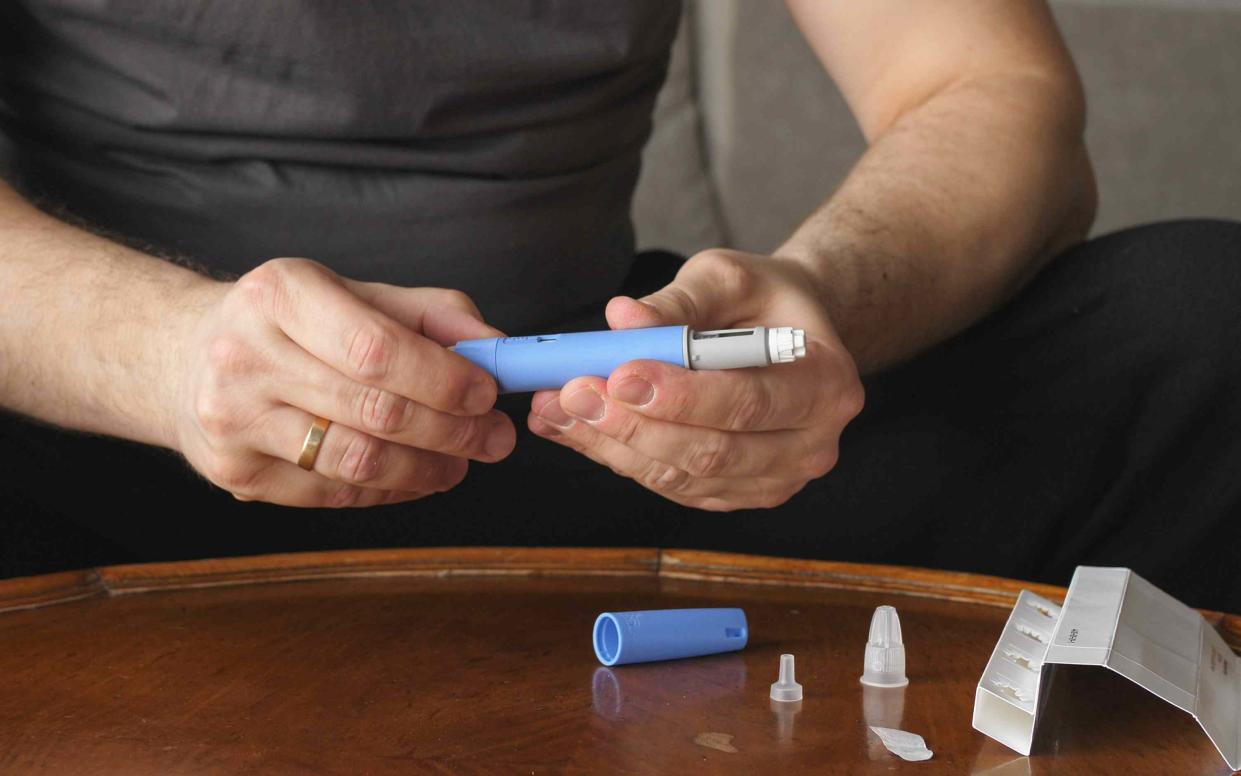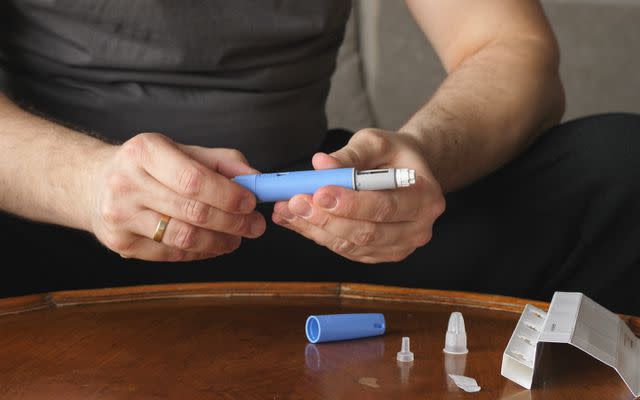Could Ozempic Be Used to Curb Addiction? Why Researchers Are Looking at This Future Option

Getty Images / imyskin
Fact checked by Nick Blackmer
Early studies are pointing to anti-obesity drugs’ potential to curb alcohol cravings in people with obesity and alcohol use disorder.
This is due to a reduced feeling of reward when alcohol is consumed, making relapse less likely.
Experts are hopeful of what this might mean for future treatments but note that there are many steps in the research that still need to happen.
Researchers are exploring the potential anti-addiction effects of weight loss drugs.
Early studies are beginning to show that anti-obesity injections including Ozempic may also curb alcohol cravings in people who have both obesity and alcohol use disorder (AUD).
If further research shows the drugs—which were originally used to control type 2 diabetes and were then approved for obesity treatment—are also an effective therapy for AUD, the injections could provide a much-needed tool in substance use medicine.
Nearly 30 million people in the United States over age 12 have AUD. Every year, 140,000 people in the U.S. die of causes related to AUD.
“We need more medications. AUD is a common disease and only four medications are currently available,” Elisabet Jerlhag Holm, PhD, a professor of pharmacology at the University of Gothenburg in Sweden, who studies the Gut-Brain Axis and Addictive Disorders, told Health.
Three medications—Disulfiram, Naltrexone, and Acamprosate—are approved by the Food and Drug Administration (FDA) for use in the U.S.
According to Lorenzo Leggio, MD, PhD, a physician-scientist at the National Institute on Alcohol Abuse and Alcoholism (NIAAA) and the National Institute on Drug Abuse (NIDA), who has been leading the NIH’s work on GLP-1 and alcohol drinking, the medications are also under-utilized and don’t work for everyone, highlighting the need for more options.
What Are GLP-1 Drugs?
Ozempic and Wegovy are both part of a class of drugs called glucagon-like peptide-1 receptor agonists (GLP-1s). They mimic a hormone that makes a person feel full, causing them to eat less and therefore lose weight. The drugs also help keep insulin and blood sugar levels stable.
“These medications are not a magic bullet. Some people respond and others do not,” he said, noting that AUD is a disease, just like cancer or hypertension.
“For any other condition, we have dozens of medications that we can choose from," Leggio continued. "But for AUD, we only have three approved by the FDA. We need more for when patients don’t respond to one.”

Getty Images / imyskin
Related: What Happens to Your Body on Ozempic?
How GLP-1 Drugs Influence Alcohol Use Disorder
In a rat study published in early June in The Lancet, Holm and her team found that a semaglutide drug binds to an area of the brain called the nucleus accumbens, which is central for reward.
In humans, this part of the brain releases dopamine when a person drinks alcohol.
The team concluded that by acting on this part of the brain, the semaglutide reduced both alcohol intake and relapse drinking—when a person returns to using a substance after quitting for a period of time—by reducing the feeling of reward associated with alcohol.
Preventing relapse drinking is key to successful long-term AUD treatment.
“If one consumes a lot of alcohol and then abstains for a period, an AUD patient has lots of craving for alcohol and this causes the individual to relapse to alcohol drinking,” said Holm. “When this happens, more alcohol is consumed than before.”
This craving-driven relapse behavior is difficult to study in rodents, and Holm cautions not all findings from animal studies should be applied to humans, But, such findings are the first step in understanding how drugs may work in people.
So far, very little research has been done on how GLP-1s impact the human brain in terms of AUD.
One randomized, double-blinded, placebo-controlled clinical trial published in 2022 included 127 human participants who had AUD and were looking for treatment. Over 26 weeks, participants were given either 2 mg weekly of a GLP-1 called exenatide, which is used as a therapy for type 2 diabetes but is not approved for weight loss, or a placebo. Both groups also received cognitive-behavioral therapy.
At the end of the trial, only those participants who were both overweight and had AUD experienced a reduction in alcohol intake.
“It could be that different neurobiology underlies overweight AUD patients compared to those with a regular weight, but we don’t know yet,” Holm said.
The results of this current research clearly point to who the treatment may be best for, should future studies conclude the drugs are both safe and effective for weight loss.
According to Holm, individuals who are not overweight would likely experience more negative side effects from using GLP-1 drugs for AUD.
What This Means for Future Treatment
It’s far too soon to say whether or not weight loss drugs like Ozempic and Wegovy will eclipse current medications used to treat AUD. According to Holm, future studies will need to compare the weight loss drugs to those used for AUD in side-by-side trials.
But the current research shows promise.
“The preclinical models we used have high validity, that is, what is seen in rodents is also observed in humans,” Holm said.
The fact that early studies have shown the drugs may be effective in people who have both AUD and obesity is a critical finding, Leggio said.
“The exenatide trial showed that it works in some patients, which is critical in medication development,” he said. “If we look for medication that will work in everybody, we will always fail. Part of the goal of medication development is finding the right medication for the right patient.”
He noted that this was a secondary finding of the trial, which is completely normal for early science, but that future studies will need to look at using semaglutides and GLP-1s specifically in people with both AUD and obesity to confirm these findings.
They will also need to confirm that the weight loss among these people is, indeed, fat loss, rather than muscle loss, which would be unhealthy.
“We are beyond excited about the work we have done and are going to do on GLP-1 and addiction,” Leggio said. “But the next step is to move forward with the gold standard clinical trials as the truly needed next step to show that these medications work or do not work.”
Related: Signs You Drink Too Much and How to Get Help
For more Health news, make sure to sign up for our newsletter!
Read the original article on Health.

